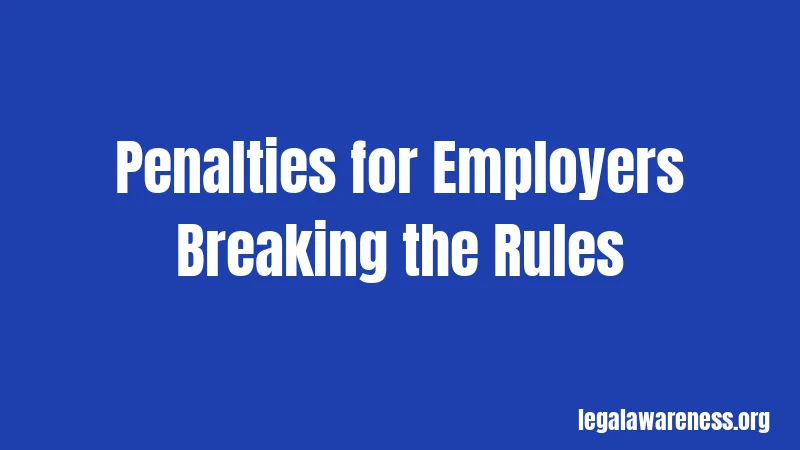Florida Lunch Break Laws in 2026: What Every Worker Should Know
Here’s something most Florida workers don’t realize. Your employer isn’t actually required to give you a lunch break. Seriously. But if they do, there are rules they have to follow. And honestly, understanding these rules can protect you from being cheated out of pay or facing illegal work conditions.
In Florida, lunch break laws aren’t as strict as some states. But they do exist. Let’s break down exactly what you need to know about your rights and what your boss can and can’t do.
What Is a Lunch Break?

A lunch break is unpaid time off during your work shift. You get to step away, eat, rest, or do whatever you want. The key word here? Unpaid. If you’re not working, you’re typically not getting paid. But here’s where it gets interesting.
Florida law makes a clear distinction. If your employer gives you a break from work, and you’re truly off the clock, that time doesn’t count as work time. You don’t get paid for it. Pretty straightforward, right?
Basic Florida Lunch Break Laws
Do Employers Have to Give Lunch Breaks?
Okay, pause. Read this carefully. Florida state law does not require employers to give any breaks at all. Not lunch breaks. Not even 15-minute coffee breaks. It’s honestly one of the more employer-friendly lunch break states in America.
That doesn’t mean employers can treat breaks any way they want, though. If your employer provides a break, certain rules kick in. They can’t just ignore labor laws because they decided to be generous.
The Unpaid Break Rule
If your boss gives you time off and you’re completely relieved from duties, that’s an unpaid break. You don’t get paid for it. Think of it like this: you’re not working, so no pay. Pretty simple.
But here’s where most people get confused. You have to be truly relieved from all work duties. If you’re answering phones during your lunch break, or monitoring anything, or doing any work at all, that time probably counts as work time and you should be paid.
State vs. Federal Law
Florida follows federal law on this issue. The federal wage and hour law (the Fair Labor Standards Act) doesn’t require breaks either. So Florida employers basically get the same freedom as any other state. You’re not alone if this surprises you. Most people assume employers must give breaks. They don’t.
However, many collective bargaining agreements do require breaks. If you’re in a union, your contract might give you more protection than Florida law. Check your union agreement if you’re a member.
When Lunch Breaks Must Be Paid

Sound complicated? It’s actually not. Here’s the rule: if you’re working, even a little bit, you must be paid. Period.
Let’s say you’re eating at your desk and answering emails. That’s work. You’re on the clock. Your employer owes you payment for that time. This applies even if you’re technically “on break.”
Situations Where Breaks Must Be Paid
Your lunch break counts as work time if you can’t leave the premises. If your employer requires you to stay in the building, or you’re required to be available, you’re working. You get paid.
You also get paid if your break is “cut short” by work demands. Let’s say you have 30 minutes for lunch. Your boss calls you back after 10 minutes. You worked for 20 minutes of your break time. That 20 minutes is paid work time.
Interruptions count too. If your boss is checking on you, texting you, or expecting you to jump when they call, you might be on the clock. You’re not truly relieved of duty. It’s a gray area, but lean toward “I should be paid” if you’re being monitored or interrupted.
Partial Rest Periods
Not sure if this applies to you? Here’s the thing: Florida courts have been pretty consistent. If you’re not completely relieved from work duties, it’s paid time.
Advanced Break Rules: What You Really Need to Know
The Salary vs. Hourly Question
Here’s where it gets interesting. If you’re a salaried employee, your situation is different. You get a fixed amount every week, no matter how many breaks you take. But wait, there’s more to know.
If you’re salaried but classified as “exempt,” your employer can usually make you skip lunch. You’re still paid your regular salary. The rules are different for exempt employees.
If you’re salaried but “non-exempt,” you might be entitled to breaks and hourly overtime. Your job title doesn’t determine this. Your actual duties do. That’s the part most people get wrong.
Job Duties That Count as Work Time
You need to know what actually counts as working. If you’re restocking shelves during your “lunch break,” you’re working. If you’re helping customers, you’re working. If you’re filling out paperwork or emails, you’re working.
But here’s the thing: if you choose to work during your break, and your employer didn’t ask you to, it’s murkier. You might still be entitled to pay, but proving it is harder. The best approach? Don’t work during breaks. And if you do, document it.
Honestly, this is probably the part most employees mess up. They work during lunch without telling anyone, then wonder why they weren’t paid. Your employer can’t read your mind. Speak up if you’re working and not getting paid.
Recent Changes to Florida Labor Law
Florida has been pretty stable on lunch break laws. There haven’t been major changes to state law since before 2024. But there have been updates to the federal minimum wage and some local ordinances in cities like Miami and other major Florida cities.
One thing changed in 2024: some Florida counties started looking more carefully at wage theft. Enforcement has gotten tighter. If your employer isn’t paying you for work time, it’s a better time than ever to report it.
Penalties for Employers Breaking the Rules

What Happens When Employers Violate Lunch Break Laws
Now here’s where it gets serious. If your boss is illegally docking your pay or not paying you for lunch break work, you have options. You can file a wage claim with the Florida Department of Labor.
The penalties can hit hard. Employers who violate wage laws can owe you back pay. That’s the money they should have paid you. Plus, they might owe you additional damages. We’re talking serious money here.
If it’s intentional wage theft, penalties get even worse. Your employer might owe double damages. That means if you should have earned $500 and they didn’t pay you, they might owe you $1,000. That’s on top of the original amount.
Your Legal Rights
You have the right to be paid for all time worked. This is your strongest protection under Florida law. No exceptions. If you worked, you deserve payment.
You also have the right to file a complaint. The Florida Department of Labor has a wage and hour division. They investigate complaints. It’s free for you. Your employer can’t retaliate against you for filing a complaint either. Retaliation is illegal.
Special Circumstances and Exceptions
What About Meal Periods vs. Rest Breaks?
You might hear people use these terms differently. Let me clear it up. A meal period is a substantial break, like lunch or dinner. Rest breaks are short breaks, like 15 minutes.
Florida law treats them differently. Meal periods don’t have to be paid (if you’re truly off the clock). Rest breaks might be required in some situations. The rules get complicated here, honestly.
The safest approach? Ask your employer for clarity. Get it in writing if possible. What counts as a break in your workplace?
Shift Differentials and Lunch Breaks
If you’re a nurse, retail worker, or in another shift-based job, your lunch break rules might be different. Shift work can complicate things.
Some employers stagger lunch breaks. You can’t all leave at the same time. That’s legal. But you still can’t be made to work during that time without compensation.
Agricultural Workers
Florida has a lot of agricultural work. Here’s the thing: farm workers have some different protections. They’re still entitled to breaks under Florida law, but the rules are slightly different. If you work on a farm, talk to a farm worker advocate. They understand your specific situation better than most.
How to Protect Your Lunch Break Rights
Document Everything
Okay, this is important. Start keeping records of your break time. When do you take breaks? How long are they? Are you interrupted?
Write it down. A simple notebook works. Or use your phone’s notes app. The important thing is having evidence if you ever need to prove something later.
Most people don’t do this. Then when they have a problem, they can’t prove what happened. Documentation is your best friend here.
Know Your Job Classification
You need to know: Are you exempt or non-exempt? Salaried or hourly? Your employer should tell you this. If they won’t, ask the Florida Department of Labor.
Your classification determines your break rights. It’s worth knowing for sure. Don’t guess.
Report Problems Early
If your employer isn’t following lunch break rules, report it. Don’t wait. File a wage claim with the Florida Department of Labor. It’s confidential. It’s free.
The longer you wait, the harder it is to prove what happened. Memory gets fuzzy. Employers destroy records. Time is on the side of the person who reports quickly.
When to Get a Lawyer
Most wage claims don’t need a lawyer. You can file them yourself. But if the amount is large, or if retaliation happens, you might want legal help. Many employment lawyers work on contingency. That means you only pay if you win.
Frequently Asked Questions
Does my employer have to give me a lunch break? No. Florida law doesn’t require employers to provide any breaks. However, many companies do because of company policy, union contracts, or industry standards. Check your employee handbook.
Can my boss make me work during lunch and not pay me? Absolutely not. If you’re working, you must be paid. Working without compensation is illegal, even if your boss says it’s “off the clock.”
What if I’m salaried? Do lunch break rules still apply? It depends. If you’re exempt, rules are different. If you’re non-exempt, you have the same protections as hourly workers. Get clarity on your classification from your employer.
Can my employer retaliate against me for complaining about unpaid lunch breaks? No. Retaliation is illegal. If your employer punishes you for filing a complaint, that’s another violation. Document the retaliation and report it.
How do I file a wage claim in Florida? Visit the Florida Department of Labor’s website. You can file online, by phone, or in person at a local office. The process is free and confidential. They’ll investigate your claim.
Final Thoughts
Here’s the bottom line. You have rights as a Florida worker. Employers must pay you for all time worked, including during lunch breaks if you’re actually working. They can’t take your break pay, make you work off the clock, or retaliate against you for protecting your rights.
If something doesn’t feel right about how your employer handles breaks, trust that instinct. Ask questions. Document what happens. And if needed, file a claim. The system exists to protect you. Use it.
Stay informed, stay safe, and remember: your time is valuable. Don’t let anyone convince you otherwise.
References
- Florida Statutes – Wage and Hour Laws: https://www.flsenate.gov/Laws/Statutes/2024 (Search for “wages” or Chapter 440-450 for employee protections)
- Florida Department of Labor: https://www.floridajobs.org/workers-business-professionals/workers/wage-and-hour-compliance (Official resource for wage and hour information, wage claims, and complaints)
- Federal Fair Labor Standards Act (FLSA): https://www.dol.gov/agencies/whd/minimum-wage/state (Federal wage law that Florida follows)
- Filing a Wage Claim in Florida: https://www.floridajobs.org/workers-business-professionals/workers/employee-rights (Step-by-step guide to filing wage complaints)
- Employee Rights Guide – Florida: https://www.dol.gov/agencies/whd/fact-sheets (Department of Labor fact sheets on wage and hour rights)
